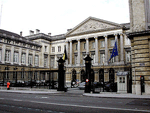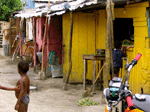SOCIAL WATCH E-NEWSLETTER - Issue 114 - December 07, 2012
Published on Fri, 2012-12-07 11:03
 |
| Issue 114 - December 07, 2012 |
|
|
|
| |
Philippines: Human development is not matter of size, but of quality

Members of the Alternative Budget
Institute (ABI), a consortium of 60
non-governmental organizations
led by Social Watch Philippines,
called on citizens to vote only for
candidates supporting the MDGs.
(Photo: ABI-ENVI)
|
The Philippines needs a post-2015 development agenda that reclaims human rights as the normative framework, especially ensuring the right to education, health and decent work, and addressing the long-standing inequalities, concludes the report 2013 of Social Watch-Philippines. Economic growth averaged 4.7 per cent a year since 2000 in this South Asian country, but only the elites harvested the benefits, while poverty increased to reach more than one of every four Filipinos, says the study.
“It is not so much the size of the economic growth, but its nature that matters,” concludes Marivic Raquiza, main author of the report. Social Watch-Philippines emphasizes that an effective post-2015 framework for development must include the completion of the agrarian reform, a brand new progressive taxation system and the revitalization of the manufacturing sector to ensure the creation of quality jobs. In the global level, a new financial architecture is required to provide adequate policy space for this and other countries to independently chart its own development agenda.
Read more
|
| |
|
| |
Belgium: cutbacks or cooperation? ODA in times of crisis

Palace of the Nation, seat of the
Belgian Federal Parliament in
Brussels.
(Photo: Belgian government)
|
“International cooperation is in danger. In Europe, which is still the biggest donor in the world, official development assistance fell for the first time since 2007, and Belgium is not an exception. In times of crisis the tendency is for fiscal austerity”. This is the conclusion of the National Cooperation Centre for Development (CNCD-11.11.11) in its contribution to the Social Watch Report 2013.
CNCD-11.11.11, which is made up of more than ninety international solidarity organizations, reports that “the spectre of poverty which is also looming over Europe”, combined with the “business closures and a questioning of the welfare state” are used as “the arguments to justify describing these as difficult times.”
Read more
|
| |
|
| |
Dominican Republic: Poverty and inequity persist in spite of the promises
|

Living in the Batey Libertad.
(Photo: Yspaniola.org)
|
To put an end to poverty, the authorities in the Dominican Republic must promote the equitable distribution of wealth, broaden and improve the quality of education, health services, employment and social security, and implement policies to help the poorest and most vulnerable people. But, according to civil society organizations in their contribution to the Social Watch Report 2013, the official rhetoric about social investment and human development is contradicting by an economic policy of cutting expenditures and increasing taxes, in accordance with conditions imposed by the International Monetary Fund.
The Dominican Republic has enjoyed steady economic growth in the last 20 years, but 35% of the Dominicans are living in poverty and 9% in extreme poverty. These are almost the same proportions as in 2000. According to the national Social Watch report, the gross domestic product has grown but wealth is not distributed in an equitable way, and lack of protection and inequality are feeding violence and crime in a vicious circle that makes it even more difficult to achieve social goals.
Read more
|
| |
|
| |
|
| |
“Means and ends”: Social Watch starts publishing country reports 2013
Over sixty national Social Watch coalitions around the world are contributing their assessments and reports to the global Social Watch report 2013, under the overall theme of "Ends and Means." The Social Watch network thus joins the current global discussions around a set of Sustainable Development Goals and on a new development framework to be put in place when the MDGs expire in 2015.
The Social Watch national platforms are independent coalitions of civil society organizations struggling for social and gender justice in their own countries. The Social Watch network has been publishing since 1996 yearly reports on how governments implement their international commitments to eradicate poverty and achieve equality between women and men.
|
|
|
| |
|
|
|
 |
|
The contents of this publication are the sole responsibility of Social Watch and can in no way be taken to reflect the views of Oxfam Novib and the Coalition of the Flemish North South Movement - 11.11.11.
|
|
|
|
SUSCRIBE TO OUR NEWSLETTER
Submit
|
